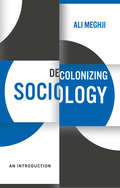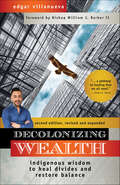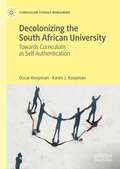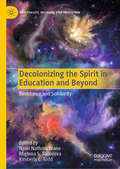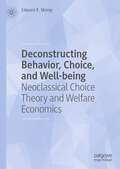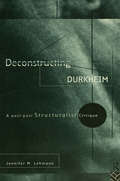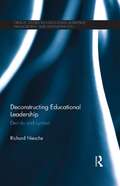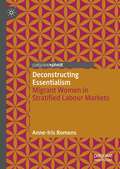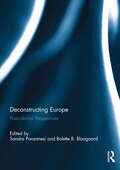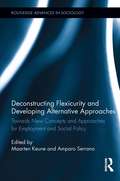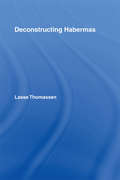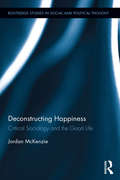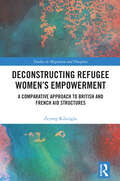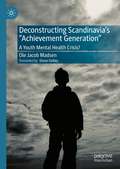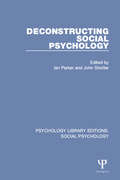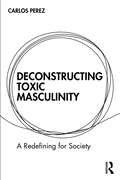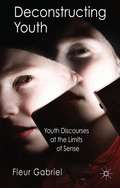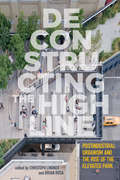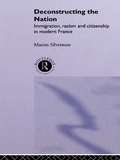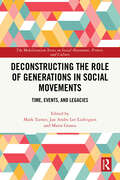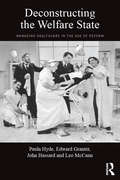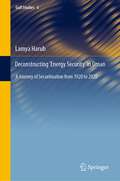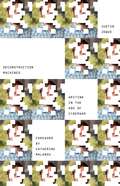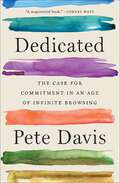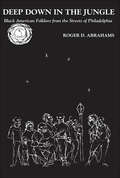- Table View
- List View
Decolonizing Sociology: An Introduction
by Ali MeghjiSociology, as a discipline, was born at the height of global colonialism and imperialism. Over a century later, it is yet to shake off its commitment to colonial ways of thinking. This book explores why, and how, sociology needs to be decolonized. It analyses how sociology was integral in reproducing the colonial order, as dominant sociologists constructed theories either assuming or proving the supposed barbarity and backwardness of colonized people. Ali Meghji reveals how colonialism continues to shape the discipline today, dominating both social theory and the practice of sociology, how exporting the Eurocentric sociological canon erased social theories from the Global South, and how sociologists continue to ignore the relevance of coloniality in their work. This guide will be necessary reading for any student or proponent of sociology. In opening up the work of other decolonial advocates and under-represented thinkers to readers, Meghji offers key suggestions for what teachers and students can do to decolonize sociology. With curriculum reform, innovative teaching and a critical awareness of these issues, it is possible to make sociology more equitable on a global scale.
Decolonizing Wealth, Second Edition: Indigenous Wisdom to Heal Divides and Restore Balance
by Edgar VillanuevaThis second edition expands the provocative analysis of the racist colonial dynamics at play in philanthropy and finance into other sectors and offers practical advice on how anyone can be a healer. The world is out of balance. With increasing frequency, we are presented with the inescapable truth that systemic racism and colonial structures are foundational principles to our economies. The $1 trillion philanthropic industry is one example of a system that mirrors oppressive colonial behavior. It's an industry whose name means “the love for humankind,” yet it does more harm than good. In Decolonizing Wealth, Edgar Villanueva looks past philanthropy's glamorous, altruistic façade and into its shadows: white supremacy, savior complexes, and internalized oppression. Across history and to the present day, the accumulation of wealth is steeped in trauma. How can we shift philanthropy toward social reconciliation and healing if the cornerstones are exploitation, extraction, and control? Drawing from Native traditions, Villanueva empowers individuals and institutions to begin to repair the damage through his Seven Steps to Healing. In this second edition, Villanueva adds inspiring examples of people using their resources to decolonize entertainment, museums, libraries, land ownership, and much more. Everyone can be a healer and a leader in restoring balance—and we need everyone to do their part. As Villanueva writes, “All our suffering is mutual. All our healing is mutual. All our thriving is mutual.” Are you ready?
Decolonizing the South African University: Towards Curriculum as Self Authentication (Curriculum Studies Worldwide)
by Oscar Koopman Karen J. KoopmanThis book offers an important contribution to the field of curriculum studies and higher education by examining the impacts of colonialism and neoliberalism in the South African education system and addressing ways to decolonise curriculum and teaching. Drawing on Pinar's work in curricular theory, the authors call for integrating self-reflective curriculum development into the national curriculum process to promote indigenous education and knowledge.
Decolonizing the Spirit in Education and Beyond: Resistance and Solidarity (Spirituality, Religion, and Education)
by Njoki Nathani Wane Kimberly L. Todd Miglena S. TodorovaThis multidisciplinary collection probes ways in which emerging and established scholars perceive and theorize decolonization and resistance in their own fields of work, from education to political and social studies, to psychology, medicine, and beyond. In this time of renewed global spiritual awakening, indigenous communities are revisiting ways of knowing and evoking theories of resistance informed by communal theories of solidarity. Using an intersectional lens, chapter authors present or imagine modes of solidarity, resistance, and political action that subvert colonial and neocolonial formations. Placing emphasis on the importance of theorizing the spirit, a discourse that is deeply embedded in our unique cultures and ancestries, this book is able to capture and better understand these moments and processes of spiritual emergence/re-emergence.
Deconstructing Behavior, Choice, and Well-being: Neoclassical Choice Theory and Welfare Economics
by Edward R. MoreyNeoclassical economists assume that people act to maximize their well-being: they choose based on their desires and only desire what they will like. Neuroscientists and psychologists disagree. Their research demonstrates that cues and evolutionary quirks cause people to act against their best interests, even choosing alternatives they will not like. In this book, Edward R. Morey contrasts neoclassical choice theory with behavioral models and findings in psychology, neuroscience, evolutionary biology, and animal behavior. The book addresses the fundamental idea within economics that behaviors are chosen, and it explains why other disciplines disagree. The chapters touch on modeling behavior, judging behavior, and policies. Morey breaks down judgment using the ethics of welfare economics, and it compares and contrasts this recognized approach with others, including Mill’s liberalism, virtue ethics, duty-based ethics, Buddhist ethics, and utilitarianism.
Deconstructing Durkheim: A Post-Post Structuralist Critique
by Jennifer M. LehmannThe author analyzes Durkheim's social theory from the standpoint of critical structuralism. She explores Durkheim's discussion of the relationship between the individual and society. She also addresses the question of Durkheim's understanding of the relationship between the subject and object of knowledge, and the relationship between truth and ideology.
Deconstructing Educational Leadership: Derrida and Lyotard (Critical Studies in Educational Leadership, Management and Administration)
by Richard NiescheJacques Derrida and Jean-François Lyotard constitute two of the most notable figures of poststructuralist thought and philosophy of the postmodern period. Both worked to reveal instabilities and uncertainty, and to destabilise assumptions and self-evident traditions for the purposes of reflection, creativity and innovative thinking. This significant volume explores the key concepts central to the work of Derrida and Lyotard in relation to educational leadership, and reveals how these ideas challenge existing structures, hierarchies and models of thought. Derrida’s notions of difference and deconstruction, and Lyotard’s concepts of language games, performativity and the differend, are specifically used to inform provocative and insightful critiques of the positivist assumptions and knowledge construction in the field of educational leadership. The book provides concrete examples of the application of theories to policy, literature and empirical data, and identifies ideas which continue to impact contemporary practices of educational leadership and management. Included in the book: - why bring Derrida and Lyotard to ELMA?- a Lyotardian politics of the standards movement in educational leadership- managing performance- witnessing deconstructions of the leader-follower binary in ELMA- limitations and critiques of Derrida and Lyotard. This important volume in the series will be of value to all those working and researching in the field of Educational Leadership, Management and Administration.
Deconstructing Essentialism: Migrant Women in Stratified Labour Markets
by Anne-Iris RomensThis book proposes an original approach to analyse the social and professional trajectories of migrant women with tertiary education. It focuses on the role of essentialism in stratifying labour markets based on gender, class and racialisation, and in limiting migrant women's employment opportunities. Based on multi-sited fieldwork conducted in France and Italy, the book highlights how essentialism influences the assessment of working capacities, stressing that skills are socially constructed and valued depending on who embodies them. It also emphasises that migrant women and labour market gatekeepers are not only passively accepting essentialism, but some are also resisting and eventually challenging this process. Deconstructing essentialism enables us to better understand the mechanisms that produce stratifications and aids in designing paths towards more equal access to employment.
Deconstructing Europe: Postcolonial Perspectives
by Sandra Ponzanesi and Bolette B. BlaagaardThis book engages with the question of what makes Europe postcolonial and how memory, whiteness and religion figure in representations and manifestations of European ‘identity’ and self-perception. To deconstruct Europe is necessary as its definition is now contested more than ever, both internally (through the proliferation of ethnic, religious, regional differences) and externally (Europe expanding its boundaries but closing its borders).This edited volume explores a number of theoretical discussions on the meaning of Europe and proposes analyzing some of the deeds committed, both today and in the past, in the name of Europe by foregrounding a postcolonial approach. To deconstruct Europe as a postcolonial place does not imply that Europe’s imperial past is over, but on the contrary that Europe’s idea of self, and of its polity, is still struggling with the continuing hold of colonialist and imperialist attitudes. The objective of this volume is to account for historical legacies which have been denied, forgotten or silenced, such as the histories of minor and peripheral colonialisms (Nordic colonialisms or Austrian, Spanish and Italian colonialism) and to account for the realities of geographical margins within Europe, such as the Mediterranean and the Eastern border while tracing alternative models for solidarity and conviviality. The chapters deal with social and political formations as well as cultural and artistic practices drawing from different disciplinary backgrounds and methodological traditions. As such it creates an innovative space for comparative and cross-disciplinary exchanges.This book was previously published as a special issue of the journal Social Identities.
Deconstructing Flexicurity and Developing Alternative Approaches: Towards New Concepts and Approaches for Employment and Social Policy (Routledge Advances in Sociology #122)
by Maarten Keune Amparo SerranoIn recent years, the concept of flexicurity has come to occupy a central place in political and academic debates regarding employment and social policy. It fosters a view in which the need for continuously increasing flexibility is the basic assumption, and the understanding of security increasingly moves from social protection to self-insurance or individual adaptability. Moreover, it rejects the traditional contradictions between flexibility and security, blending the two into a single notion and thus depoliticizing the relationships between capital and labour. This volume provides a critical discussion of the flexicurity concept, the theories upon which it is built and the ideas that it transmits about work, unemployment and social justice. It shows that flexicurity fosters the further individualization of social protection, an increase in precariousness and the further weakening of labour in relation to capital. The authors present a series of alternative theoretical, normative and policy approaches that provide due attention to the collective and political dimension of vulnerability and allow for the development of new societal projects based on alternative values and assumptions.
Deconstructing Habermas (Routledge Studies in Social and Political Thought #Vol. 51)
by Lasse ThomassenThis book is the first book-length deconstructive study of the political philosophy of Jürgen Habermas. Inspired by the work of Jacques Derrida, the book applies deconstruction to key issues in Habermas’s work: rational discourse and rational consensus, constitutional democracy, tolerance and civil disobedience. The war in Iraq brought Habermas and Derrida together in defense of international law and in favor of a bigger role for a united Europe in international affairs. Yet, despite the rapprochement between Habermas and Derrida in the years prior to Derrida’s death, important differences remain between Habermas’s critical theory and Derrida’s deconstruction. These differences reflect differences between post-structuralism and critical theory and between postmodernists and the defenders of modernity.
Deconstructing Happiness: Critical Sociology and the Good Life (Routledge Studies in Social and Political Thought #109)
by Jordan McKenzieThis book offers an original account of the good life in late modernity through a uniquely sociological lens. It considers the various ways that social and cultural factors can encourage or impede genuine efforts to live a good life by deconstructing the concepts of happiness and contentment within cultural narratives of the good life. While empirical studies have dominated the discourse on happiness in recent decades, the emphasis on finding causal and correlational relationships has led to a field of research that arguably lacks a reliable theoretical foundation. Deconstructing Happiness offers a step toward developing that foundation by offering characteristically sociological perspectives on the contemporary fascination with happiness and well-being. In doing so, it seeks to understand the good life as a socially mediated experience rather than a purely personal or individually defined way of living. The outcome is a book on happiness, contentment and the good life that considers the influence of democracy, capitalism and progress, while also focusing on the more theoretical challenges of self-knowledge, reason and interaction.
Deconstructing Refugee Women’s Empowerment: A Comparative Approach to British and French Aid Structures (Studies in Migration and Diaspora)
by Zeynep KilicogluThis book explores how self-identified feminist or women’s organizations in the asylum and charity sectors in the United Kingdom and France attach meanings to and address refugee women’s empowerment in their operations and how these perpetuate or disrupt global hierarchies.Adopting a feminist, intersectional, and post-colonial approach, this book provides a nuanced assessment on how refugee assistance might move beyond the dominant “vulnerability versus empowerment” dichotomy. Acknowledging how some of the current practices still impose vulnerability on women, it aims to contribute to the newly established literature exploring how refugeehood and asylum-seeking are not necessarily disempowering for fleeing women, as they can provide new opportunities for negotiating gender norms, supporting women to practice agency. Building on rich empirical work conducted via semistructured interviews with refugee women and aid professionals, and participant observation in refugee communities, the book scrutinises how refugee women’s empowerment is embedded in the histories of colonialism, biopolitics, racism, and patriarchy, which legitimises the boundaries between the West and the rest, and it sheds light on the new strategies created by communities to move beyond these hierarchies, acknowledging women as autonomous actors who do not need to rely on aid structures.Students and scholars of migration and refugee studies, feminist international relations, gender studies, postcolonial studies, alongside humanitarian practitioners, policy-makers, and advocates that operate at various levels, will find this interdisciplinary book useful for understanding the realities of refugee women and professional workers in aid structures.
Deconstructing Scandinavia's "Achievement Generation": A Youth Mental Health Crisis?
by Ole Jacob MadsenIn this book, Professor Ole Jacob Madsen analyses the implications of Scandinavia's current concern for the mental health problems of adolescents, said to be struggling in the face of increasing demands for achievement and success. It critically examines our understanding of this so-called “achievement generation”, questioning whether today’s youth are really worse off than previous generations and how we have come to believe that this is so. The author’s wide-ranging investigation draws on a large body of research, as well as considering socio-political, historical and regional factors that might be affecting the resilience and mental health among young people. It also provides original psycholinguistic studies of popular media concepts associated with these issues including: “the achievement generation”, “pathological perfection” and “the good girl syndrome”. Deconstructing Scandinavia’s “Achievement Generation” presents an engaging contribution to key debates around therapeutic culture and society in the 21st century. It will appeal to students and scholars of critical and social psychology, sociology, anthropology, philosophy; as well as to those working in education, social work and mental health.
Deconstructing Social Psychology (Psychology Library Editions: Social Psychology)
by Ian Parker John ShotterSince the early 1970s, social psychology has been in crisis. At the time Reconstructing Social Psychology (Armistead) provided a critical review of theories and assumptions in the discipline. Originally published in 1990, this title not only updates that review but illustrates the ways in which assumptions had changed at the time. The crisis is no longer seen as one which can be resolved within social psychology itself, but rather as one more deeply rooted in modern society. The contributors look at the issues raised by deconstruction in the other human sciences, as well as investigating the claims made by social psychology as a discipline. They examine the rhetoric and texts of social psychology, analysing how the texts which hold the discipline together obtain their power. The arguments include the political implications of deconstructive ideas, focusing on particular issues such as research, therapy and feminism. Deconstructing Social Psychology presents a strong selection of new critical writing in social psychology. It will still be a useful text for students of psychology, social science, and sociology, and for those working in the area of language.
Deconstructing Toxic Masculinity: A Redefining for Society
by Carlos PerezThis accessible book explores toxic masculinity, looking at how to define it, and how we can and should challenge its spread. This book draws on Derrida’s deconstruction, using the philosophical lens to deconstruct what toxic masculinity means and to better understand its significance for our society. It focuses on how harmful aspects of masculinity spread, infiltrate, and intoxicate our societies and how existing structures allow aspects of harmful masculinity to become toxic. This book also features discussions and analysis of participants’ lived experiences of masculinities, alongside the author’s reflections. It explores the relevance of toxic masculinity in work environments, politics, relationships, and gender roles and seeks to challenge and mitigate its damages for everyone. Encouraging critical thinking and understanding of healthier ways of being for all, this timely book will be of interest to therapists, counselors, teachers, and practitioners of family studies. It will also be useful reading for students in the fields of psychology, gender studies, sociology, and related fields.
Deconstructing Youth
by Fleur GabrielYoung people are regularly cast as a threat to social order. Deconstructing Youth argues that this is due in part to the way the notion of youth is conceptualised in Western society. Drawing on Derridean deconstruction, Gabriel analyses the limits of dominant youth discourses, revealing the ways in which common sense assumptions about young people are marked by contradictory expectations that actually function to create youth as a 'problem'. With case studies on youth sexuality, violence and developmental neuroscience, she details how these contradictions go unrecognised in attempts to make sense of young people's identities and actions. Gabriel argues that this leads to the misattribution of blame to young people who are then taken to operate outside the boundaries of acceptable conduct. In response, she considers what a deconstructive approach has to offer in terms of moving beyond these conceptual limits and in opening up to more enabling possibilities for understanding youth.
Deconstructing the High Line: Postindustrial Urbanism and the Rise of the Elevated Park
by Alan Smart Brian Rosa Christoph Lindner Daan Wesselman Danya Sherman Darren Patrick James Corner Julian Brash Kevin Loughran Nate Millington Phil Birge-Liberman Scott Larson Tom BakerThe High Line, an innovative promenade created on a disused elevated railway in Manhattan, is one of the world’s most iconic new urban landmarks. Since the opening of its first section in 2009, this unique greenway has exceeded all expectations in terms of attracting visitors, investment, and property development to Manhattan’s West Side. Frequently celebrated as a monument to community-led activism, adaptive re-use of urban infrastructure, and innovative ecological design, the High Line is being used as a model for numerous urban redevelopment plans proliferating worldwide.Deconstructing the High Line is the first book to analyze the High Line from multiple perspectives, critically assessing its aesthetic, economic, ecological, symbolic, and social impacts. Including several essays by planners and architects directly involved in the High Line’s design, this volume also brings together a diverse range of scholars from the fields of urban studies, geography, anthropology, sociology, and cultural studies. Together, they offer insights into the project’s remarkable success, while also giving serious consideration to the critical charge that the High Line is “Disney World on the Hudson,” a project that has merely greened, sanitized, and gentrified an urban neighborhood while displacing longstanding residents and businesses.Deconstructing the High Line is not just for New Yorkers, but for anyone interested in larger issues of public space, neoliberal redevelopment, creative design practice, and urban renewal.
Deconstructing the Nation: Immigration, Racism and Citizenship in Modern France (Critical Studies in Racism and Migration)
by Maxim SilvermanDeconstructing the Nation examines the connection between racism and the development of the nation-state in modern France. The author raises important questions about the nature of citizenship rights in modern French society and contributes to wider European debates on citizenship. By challenging the myths of the modern French nation Maxim Silverman opens up the debate on questions of immigration, racism, the nation and citizenship in France to non-French speaking readers. Until quite recently these matters have largely been ignored by researchers in Britain and the USA. However, European integration has made it essential to look beyond national frontiers. The major part of his analysis concerns the period from the end of the 1960s to the beginning of the 1990s. Yet contemporary developments are placed in a historical context: first through a consideration of the construction of the modern question of immigration since the second half of the nineteenth century, and second through a survey of political, economic and social developments since 1945. There are analyses of the major debates on nationality in 1987 and the headscarf' affair of 1989. Finally questions of immigration, racism and citizenship are considered within the framework of European integration.
Deconstructing the Role of Generations in Social Movements: Time, Events, and Legacies (The Mobilization Series on Social Movements, Protest, and Culture)
by Maria Grasso Mark Turner Jan Andre Lee LudvigsenAlthough questions of how a social group’s shared experiences growing up in particular historical and social contexts shapes their identities, including their political identities, have engaged sociologists of family, youth, citizenship, culture, and political change, few books have so far examined the specific role of generations and generational consciousness in social movement activism. As such, this is the first book to focus exclusively on issues of temporality, events, and generational legacies in social movements. In demonstrating how generational consciousness, and specific frames, narratives, and repertoires of contention are shaped by, and respond to, historical and contemporary meanings of major events and social transformations in different locations, new important questions on race, class, ethnicity, gender, sexuality, and citizenship are revealed at new, emerging critical junctures in the twenty-first century,With its high-quality chapters and transnational scope, this book will capture several key trends in the role of generations in social movements and explores topics including contemporary feminism, family, and intergenerational transmission, generationality and political change, rituals and social change, and Black politics and US democracy.This is an invaluable resource for students and academics with an interest in sociology, political science, and the study of social movements and social change, and for policymakers and readers with a general interest in intergenerational conflict and the challenges of engaging new youth generations in political and democratic structures and processes.
Deconstructing the Welfare State: Managing Healthcare in the Age of Reform
by John Hassard Paula Hyde Leo McCann Edward GranterWho are NHS middle managers? What do they do, and why and how do they do it’? This book explores the daily realities of working life for middle managers in the UK’s National Health Service during a time of radical change and disruption to the entire edifice of publicly-funded healthcare. It is an empirical critique of the movement towards a healthcare model based around HMO-type providers such as Kaiser Permanente and United Health. Although this model is well-known internationally, many believe it to be financially and ethically questionable, and often far from 'best practice' when it comes to patient care. Drawing on immersive ethnographic research based on four case studies – an Acute Hospital Trust, an Ambulance Trust, a Mental Health Trust, and a Primary Care Trust – this book provides an in-depth critical appraisal of the everyday experiences of a range of managers working in the NHS. It describes exactly what NHS managers do and explains how their roles are changing and the types of challenges they face. The analysis explains how many NHS junior and middle managers are themselves clinicians to some extent, with hybrid roles as simultaneously nurse and manager, midwife and manager, or paramedic and manager. While commonly working in ‘back office’ functions, NHS middle managers are also just as likely to be working very close to or actually on the front lines of patient care. Despite the problems they regularly face from organizational restructuring, cost control and demands for accountability, the authors demonstrate that NHS managers – in their various guises – play critical, yet undervalued, institutional roles. Depicting the darker sides of organizational change, this text is a sociological exploration of the daily struggle for work dignity of a complex, widely denigrated, and largely misunderstood group of public servants trying to do their best under extremely trying circumstances. It is essential reading for academics, students, and practitioners interested in health management and policy, organisational change, public sector management, and the NHS more broadly.
Deconstructing ‘Energy Security’ in Oman: A Journey of Securitisation from 1920 to 2020 (Gulf Studies #6)
by Lamya HarubThis book makes a substantial and timely contribution to discussions on energy security in Oman, providing a systematic analysis of energy security in Oman from 1920 to 2020. It is particularly relevant in light of the recent global geopolitics of the Gulf particularly, and the Middle Eastern region broadly, as well as connecting to current climate change research and debates. Combining a political sociological account with postcolonial concepts within a theoretical and empirical exploration of energy politics, the book weaves a study of energy security into the historical and contemporary development of political, economic, security, and social structures in Oman. Including interviews with Omani and Oman-based practitioners, as well as grounded in historical documents which include Arabic-language sources, this book evaluates the energy question beyond the typical economic perspective, considering socio-political opportunities and challenges. It also makes economic-related recommendations in tandem with rentier state theory. Unlike the dominant accounts of energy security in Oman, this book sets itself apart by moving away from utilising liberal and realist approaches for its analysis and engages systematically with critical security studies to introduce a non-Eurocentric perspective to the arena. Of interest to scholars in Middle Eastern history, energy security, and security studies, this book assumes an important place in the critical literature on the Gulf, particularly within environmental studies and energy policy literature.
Deconstruction Machines: Writing in the Age of Cyberwar (Electronic Mediations #54)
by Justin JoqueA bold new theory of cyberwar argues that militarized hacking is best understood as a form of deconstruction From shadowy attempts to steal state secrets to the explosive destruction of Iranian centrifuges, cyberwar has been a vital part of statecraft for nearly thirty years. But although computer-based warfare has been with us for decades, it has changed dramatically since its emergence in the 1990s, and the pace of change is accelerating.In Deconstruction Machines, Justin Joque inquires into the fundamental nature of cyberwar through a detailed investigation of what happens at the crisis points when cybersecurity systems break down and reveal their internal contradictions. He concludes that cyberwar is best envisioned as a series of networks whose constantly shifting connections shape its very possibilities. He ultimately envisions cyberwar as a form of writing, advancing the innovative thesis that cyber attacks should be seen as a militarized form of deconstruction in which computer programs are systems that operate within the broader world of texts. Throughout, Joque addresses hot-button subjects such as technological social control and cyber-resistance entities like Anonymous and Wikileaks while also providing a rich, detailed history of cyberwar. Deconstruction Machines provides a necessary new interpretation of deconstruction and timely analysis of media, war, and technology.
Dedicated: The Case for Commitment in an Age of Infinite Browsing
by Pete DavisA profoundly inspiring and transformative argument that purposeful commitment and civic engagement can be a powerful force in today&’s age of restlessness and indecision.Most of us have had this experience: browsing through countless options on Netflix, unable to commit to watching any given movie—and losing so much time skimming reviews and considering trailers that it&’s too late to watch anything at all. In a book inspired by an idea first articulated in a viral commencement address, Pete Davis argues that this is the defining characteristic of the moment: keeping our options open. We are stuck in &“Infinite Browsing Mode&”—swiping through endless dating profiles without committing to a single partner, jumping from place to place searching for the next big thing, and refusing to make any decision that might close us off from an even better choice we imagine is just around the corner. This culture of restlessness and indecision, Davis argues, is causing tension in the lives of young people today: We want to keep our options open, and yet we yearn for the purpose, community, and depth that can only come from making deep commitments. In Dedicated, Davis examines this quagmire, as well as the counterculture of committers who have made it to the other side. He shares what we can learn from the &“long-haul heroes&” who courageously commit themselves to particular places, professions, and causes—who relinquish the false freedom of an open future in exchange for the deep fulfillment of true dedication. Weaving together examples from history, personal stories, and applied psychology, Davis&’s &“insightful without being preachy…guide to commitment should be on everyone&’s reading list&” (Booklist, starred review).
Deep Down in the Jungle...: Negro Narrative Folklore From The Streets Of Philadelphia
by Roger D. AbrahamsWith the growth of interest in folklore, it becomes increasingly evident that the presentation of a collection needs some rationale more than the fact that traditional materials have been collected and properly annotated. Much has been gathered and is now accessible through journals, archives, and lists. If a corpus of lore is not presented in some way, which bears new light on the process of word-of-mouth transmission, on traditional forms or expressions, or on the group among whom the lore was encountered, there is little reason to present it to the public. This work represents an attempt to present a body of folklore collected among one small group of Black Americans in a neighborhood in South Philadelphia. The author's approach toward collection and presentation has been intensive. He has tried to collect "in depth," and to recreate in his presentation the social background in which the lore was found, and to relate the lore with the life and the values of the group. Abraham's work is a departure from any past methods of analyzing folklore, and therefore a description of the author's point of view and his method will be given first. The majority of this work was written before his methodology was actually formulated. However throughout the project û the object was to illuminate as fully as possible the lore of one small group of African Americans from urban Philadelphia. The methodology, which developed, did so because of this objective more than anything else. Though the formulation of this theory may seem ex post facto, it is included because it clarified much during the rewritings of this book, and more importantly, because it will clarify many matters for the lay reader and for the professional folklorist.
